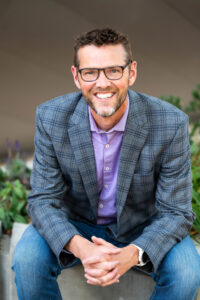As I write this, I am on day seven of working and living from home during the coronavirus pandemic, now with a snowstorm hitting outside. It’s quite a contest between me and my unschooled and unfriended kids as to who can put more crazy into the phrase “stir crazy.”
During the week, I’ve pursued ways to actively connect with neighbors in need. I’ve even risked my interior peace by signing up for the dreaded NextDoor social app. It has confirmed that both the worst and best of humanity goes on display at times of crisis.
I saw a report of a person emptying the entire soup aisle of my grocery store into their cart. I’ve seen people quote FoxNews and MSNBC reports in vitriolic attacks against each other.
But I’ve also seen a hunter donate his freezer full of venison to neighbors victimized by grocery hoarders. People are rallying support for takeout ordering from local family-owned restaurants. I’ve watched people mobilize grocery runs for the eldery and self-quarantined. In most cases, people respond so quickly to a NextDoor help request that I’m too late to do anything myself. What a gift of neighbors loving one another!
At our March 5280 Fellowship Saturday group session, we held an entirely Zoom-based teaching and discussion session on the topic of neighbor love shown through acts like those. We asked what it means to know, love, and serve our place, whether that is our neighborhood or workplace...even our workplace-gone-remote-and-digital.
At our Fellowship session, we discussed the story of Esther, an amazingly timely read for our cultural moment. Esther was a Jew, hiding her national identity as she became the queen of Persia. When her cousin, Mordecai, refused to bow worshipfully toward Haman, a Persion official, Haman launched a genocide against against the Jews in the land. Mordecai implored his cousin not to hide self-protectively in her privileged place, but to steward her position by seeking the King’s saving intervention for their fellow Jews.
Mordecai’s famous words are poignant for Christians who might steward their lives during a public health crisis: “And who knows but that you have come to your royal position for such a time as this?” (Esther 4:14)
Right now, a critical aspect of neighbor love includes “physical distancing.” Stephen Redden, pastor at New Denver Church, points out that physical distancing protocols should not mean social distancing like isolation–people need social connection, even from a safe distance! We can serve others sacrificially as we flatten an infection curve and suspend gathering with others.
But like Esther, we will also need to weigh the tensions of self-protection versus self-sacrifice in the tangible care of others.
Do we have more than a week’s worth of toilet paper, cleaners, or meat that we can share?
What skills do we have that can be lent to neighbors?
Are we able to order out and tip more than our budget normally allows?
Is there a food bank we can give to?
Can we give extra time to calls, texts, notes, and prayers for coworkers and neighbors?
Can we play a midday game with the kids when we’ll have to work late at night to make up for it?
“For such a time as this,” faithful Christians can practice whole-life stewardship and financial generosity. Everything we have, everything we can do, every amount of creativity gets pointed toward the question: How can I love and serve my neighbors in need?
Throughout history, the church has responded to crises faithfully and sacrificially. When the Roman elite fled to the country in the second century Antonine Plague, the Christians rushed into the cities to nurse the sick and the dying. In response to the bubonic plague of 1527, Martin Luther wrote the tract “Whether Christians Should Flee the Plague” (TLDR: we should die responding).
What if the tragedy of the coronavirus provides a chance for the Church to be radically known for self-sacrificial love of our neighbor?
In the words of the liturgical prayer Kyrie, eléison: Lord, have mercy. Upon your people, through your people, and upon our world in crisis.

Brian is the VP of Formation here at DIFW and also leads our 5280 Fellowship program. Prior to landing at DIFW, he served in pastoral ministry for thirteen years and at Denver Seminary for four years. His vocation includes moving ideas out into life through relationships and conversation – whether that applies to God, work, the Church, good beer, or Liverpool Football Club. He married way out of his league, and spends most of his free-time being parented by his two daughters.